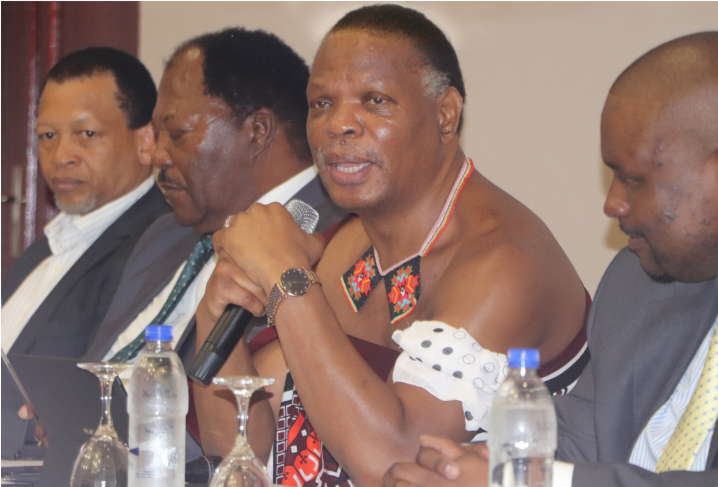By Ncaba Ntshakala
Minister of Natural Resources and Energy, Prince Lonkhokhela, has announced that electricity tariffs will increase by an average of 8% for the 2025/26 financial year and 7% for 2026/27, following government intervention to cushion consumers from the higher increases of 14% initially approved by the Eswatini Energy Regulatory Authority (ESERA).
The Minister made this announcement during a press briefing held at the Royal Villas, where he was joined by Eswatini Electricity Company (EEC) Board Chairman Patrick Myeni, EEC Managing Director Ernest Mkhonta, and other senior officials.
The Minister acknowledged that ESERA had approved an average tariff increase of 14.67% for 2025/26 and 10.91% for 2026/27, which was already a reduction from EEC’s initial request of 25.51% and 27.06% for the two financial years.
RELATED: ESERA approves 14.1% electricity hike
However, he noted that even these revised figures posed a significant burden on businesses and households, particularly given the current economic challenges.
He emphasized that government remains deeply concerned about the financial strain that electricity price increases impose on emaSwati and businesses, describing excessive electricity costs as equivalent to a lack of service delivery.
“Electricity is not different from the air we breathe. If the cost becomes too high, it effectively denies people access to power, which is crucial for economic recovery,” the Minister stated.
He added that as per His Majesty King Mswati III’s directive during the official opening of Parliament, it is vital to support economic revival, and ensuring affordable electricity is a key component of this strategy.
The government, as the sole shareholder of EEC, has therefore stepped in to mitigate the impact of the price increase.

The Minister announced that following careful consideration, government had resolved to lower the approved tariff hikes to 8% for 2025/26 and 7% for 2026/27.
To achieve this, the Ministry of Natural Resources and Energy will engage with EEC to find ways to address the funding gap created by this intervention in the most economically viable manner.
While pledging government support to ensure EEC’s continued operation and supply of reliable electricity, the Minister stressed that EEC must also implement stringent austerity measures.
He urged the company to practice financial prudence and efficiency which will ensure that its cost structures do not place an unnecessary burden on consumers.
Moreover, beyond immediate tariff relief, the government is taking long-term steps to stabilize electricity prices.
The Minister highlighted that investments in new power generation projects must be accelerated to reduce dependence on expensive electricity imports.
He announced that the country expects most of its new generation capacity under procurement to be commissioned within the next two years, reducing the cost of power over time.
RELATED: ESERA records E49.23 million income
The goal, he stated, is for Eswatini to achieve energy self-sufficiency within four years.
Prince Lonkhokhela further called on electricity consumers to adopt energy-saving measures to minimize costs.
“Every consumer has a responsibility to use electricity wisely and avoid wasteful consumption.
This not only reduces household and business expenses but also contributes to national efforts to manage electricity demand effectively,” he said.
When addressing concerns that the government’s intervention could set a precedent for future tariff decisions, the Minister clarified that this was a one-time response to the prevailing economic conditions.
“This intervention is not meant to alter the independence of the regulator but to provide necessary relief in extraordinary circumstances,” he stated.
He also revealed that the Ministry has requested ESERA to review its tariff methodology to reduce extreme fluctuations in electricity pricing and provide more stability for consumers.
The Minister further expressed appreciation to emaSwati for their active participation in the public consultations on the tariff increases.
He also extended gratitude to ESERA and EEC for their commitment to due process in determining the tariffs.
In conclusion, he thanked His Majesty King Mswati III for his leadership, as well as the Prime Minister, the Deputy Prime Minister, and the entire Cabinet for their support in addressing the issue.


